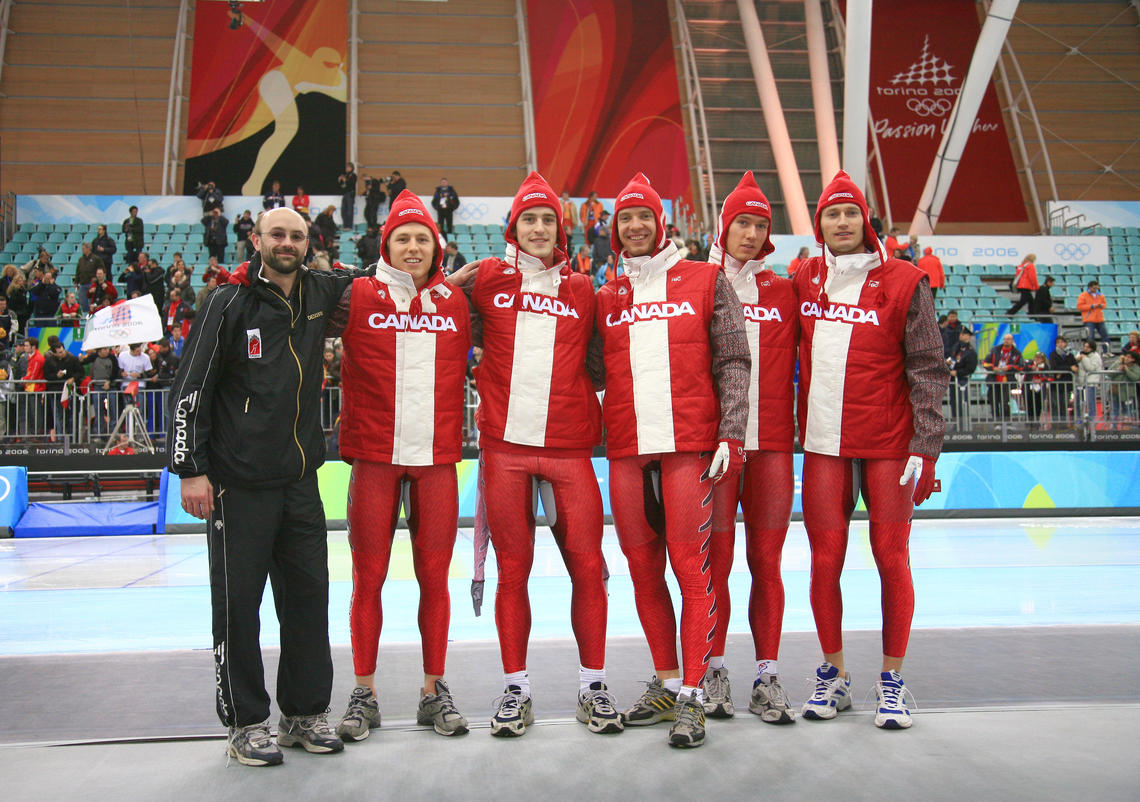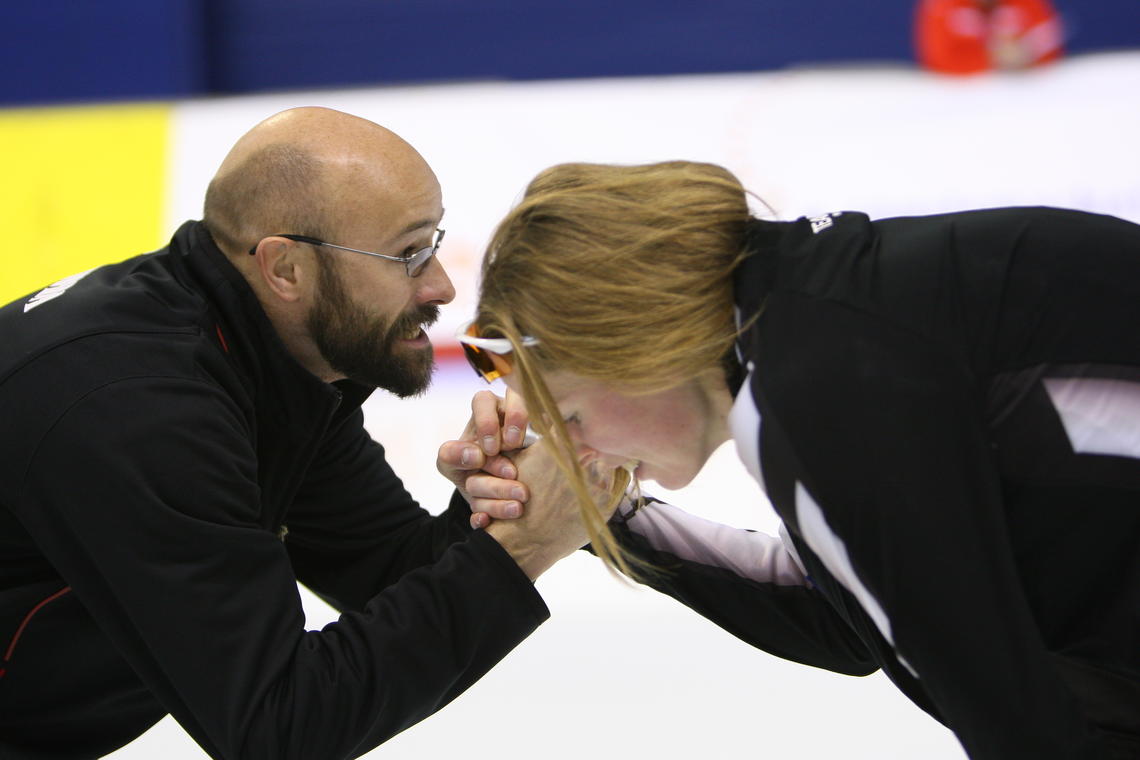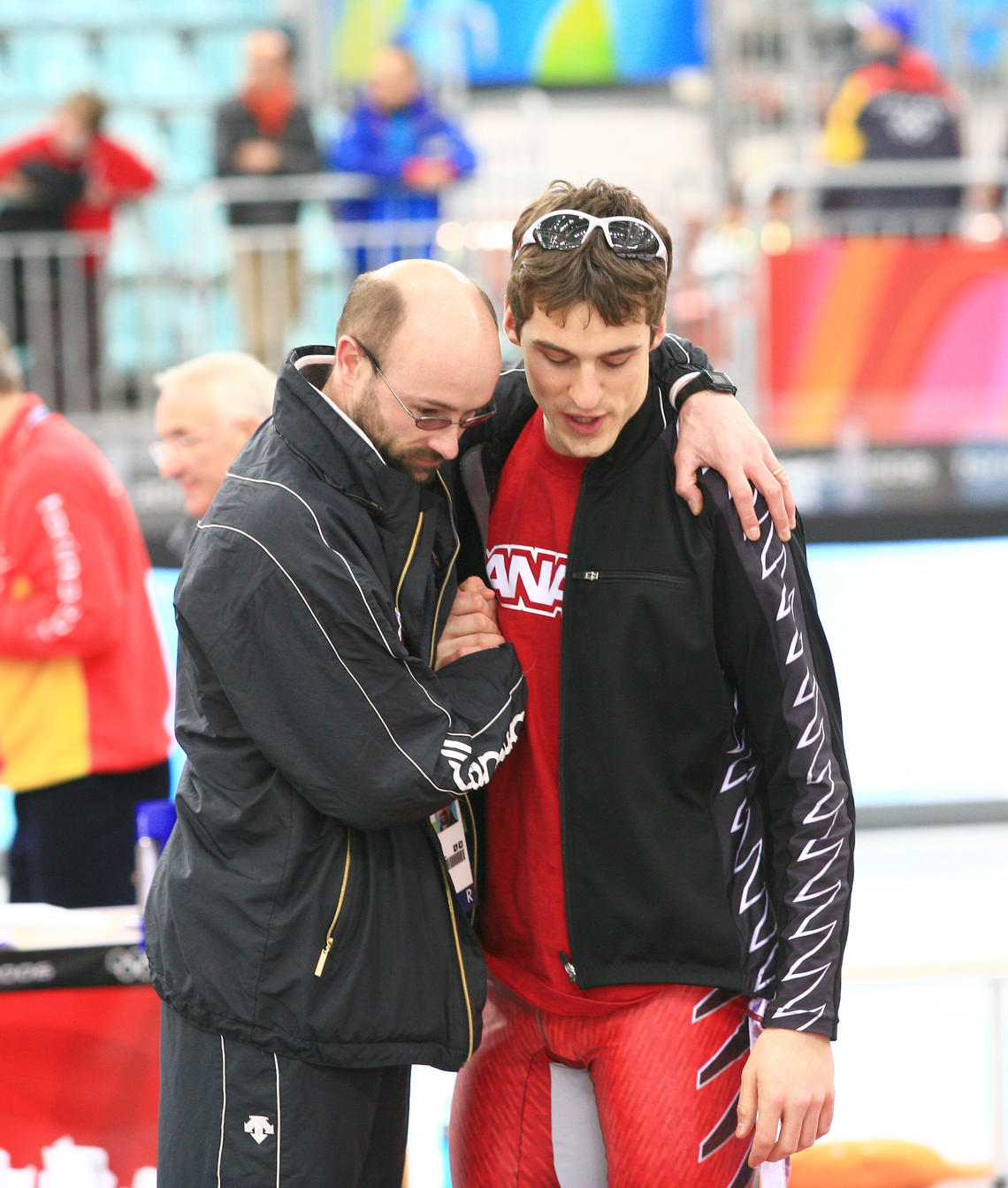June 5, 2014
Longtime Oval coach to be inducted into Canadian Olympic Hall of Fame

Marcel Lacroix, left, with members of the national long-track speedskating team at the 2006 Olympics
Arno Hoogveld, University of Calgary
A moment in the spotlight is rare for most coaches, and on Friday, Marcel Lacroix, associate director of sport at the Olympic Oval, plans to savour every moment.
“As a coach you try to get your athletes to go for the biggest honour, to go and get those medals and be world champions," says Lacroix. "You bring them to the stage to perform and they’re the ones who stand on the podium after. That’s part of the coaching job. When something like this comes along and then you're recognized by a sporting community and by the Olympic community, it’s like, 'Wow!’ ”
The long overdue recognition is Lacroix’s induction into the Canadian Olympic Hall of Fame, part of the Celebration of Excellence event June 4-6 in Calgary, Edmonton, and Ottawa. The event will showcase many of the athletes who represented Canada in Sochi and in previous Olympic Games. The list of 2014 inductees also includes two names with close ties to the University of Calgary: Cindy Klassen, who called the Oval home for many years and took classes enroute to becoming a six-time Olympic medalist; and Kyle Shewfelt, three-time Olympian and Olympic gold medalist who trained at the University of Calgary Gymnastics Centre for much of his career

Marcel Lacroix with Christine Nesbitt after she won a World Cup medal in Calgary in 2006-'07.
Arno Hoogveld, University of Calgary
In Lacroix’s case, the recognition may have been deserved, but it came as a big surprise. A fixture at the Oval for many years, his first role was as short-track coach, where he became the only Canadian speedskating coach to lead athletes in both long- and short-track speedskating to Olympic medals. He coached many of Canada’s brightest stars over the years and in his last Games, Vancouver 2010, he energized Christine Nesbitt and the men’s pursuit team to gold-medal performances. Lacroix coached short-track speedskating at the 1998 Olympics and long-track at the 2006 and 2010 Olympic Games.
His Hall of Fame credentials include 29 years of experience; six Olympic medals (four gold and two silver) in three Olympic Games; seven-time winner of the Longines-Wittnauer Coaching Excellence Award; Speed Skating Canada’s 2004 Coach of the Year; Jack Donahue Coach of the Year Award in 2011; and the Coaching Association of Canada/Petro-Canada Coaching Excellence Award recipient seven times.
Lacroix is well known as a great teacher as well as a passionate and fiery coach. While his teaching approach has a similar end goal for every athlete, it isn't a cookie-cutter method. Every athlete requires unique treatment. “I wasn’t coaching Christine Nesbitt the same way I was coaching Lucas Makowsky or Denny Morrison. It was a very, very different approach; I had to adapt my style according to the athlete — basically respecting who they were. I use the analogy of getting them to jump higher and higher and higher in order to achieve their goals. You need to understand who they are and adapt your coaching style, because in the end, they are the ones who have to make that decision of wanting to jump higher or not. So if you’ve got just one coaching style for everybody, well it is going to be very much hit and miss, you know what I mean?”

Marcel Lacroix with speedskater Denny Morrison after an Olympics race in Torino, Italy in 2006.
Arno Hoogveld, University of Calgary
The role of coach is strange. Obviously instrumental in an athlete’s success, the coach is often overshadowed in that elusive moment of glory. For his part, Lacroix says he takes supreme satisfaction in his athletes' successes. ”I have made a difference in somebody’s life, like Christine Nesbitt, Makowsky, Morrison and the other skaters I’ve coached,” says Lacroix. “For the rest of their lives they can claim that they were the best at something on the planet. On that day nobody was better than they were. I feel good about this, and that is what goes through my head going through this induction: Feel good about what you have achieved because you have given somebody the opportunity to be the best in the world and they did achieve that. I did make a difference in somebody’s life in a very, very important way.”
The June 6 Parade of Champions starts at 11:30 a.m., on 8th Avenue S.W., starting at 10th Street S.W. and running to Olympic Plaza where an outdoor celebration will take place with live entertainment and Olympian interaction, including autographs and onstage interviews. The Canadian Olympic Hall of Fame Gala, and the sold out induction ceremony, take place at the Saddledome Friday evening.
